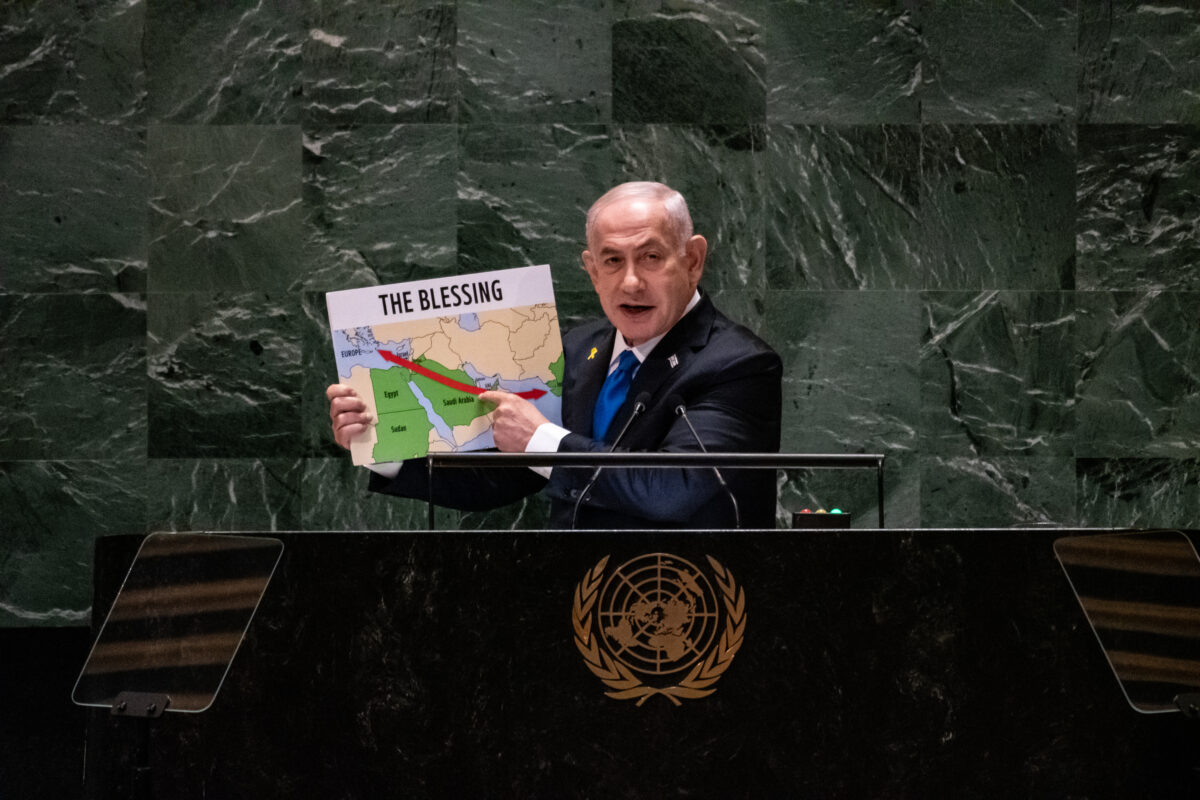Netanyahu sets out a choice between a ‘blessing’ and a ‘curse’ in UNGA speech

The Israeli leader brandished two maps — one showing a normalization corridor through the Gulf and the Middle East, the other showing the proliferation of Iran’s proxies
In his address to the United Nations General Assembly on Friday, Israeli Prime Minister Benjamin Netanyahu set out what he described as a choice for the nations of the Middle East and the world, between the “blessing” of expanded regional normalization or the “curse” of Iran, its proxies and Oct. 7.
“Ladies and gentlemen, as Israel defends itself against Iran in the seven-front war, the line separating the blessing and the curse could not be more clear,” Netanyahu told delegates, brandishing a pair of maps — one showing a potential normalization corridor through the Gulf and the Middle East and the other showing the proliferation of Iran’s proxies
“On the one hand, a bright blessing, a future of hope,” he said. “On the other hand, a dark future of despair… Israel has made its choice. We seek to move forward to a bright age of prosperity and peace. Iran and its proxies have also made their choice. They want to move back to a dark age of terror and war.”
He said that the countries of the world must choose which side they will stand on. Netanyahu argued that Israel’s wars against international terrorist groups are a fight against a common global enemy. He condemned those at the U.N. and elsewhere who he said have tried to cast Israel as evil and Iran and its proxies as good.
Netanyahu made the case for Israel’s escalating campaign against Hezbollah, which, he emphasized, has targeted citizens from a slew of countries, not limited to Israel.
“As long as Hezbollah chooses the path of war, Israel has no choice and Israel has every right to remove this threat and return our citizens to their homes safely, and that’s exactly what we’re doing,” Netanyahu said, asserting that Israel has had significant success in its recent operations. More than 60,000 residents of northern Israel have been evacuated since Oct. 7.
He said that Israel has been “tolerating this intolerable situation” of communities being evacuated from northern Israel for a year but “enough is enough,” vowing that Israel would ensure its citizens can return home and “will not accept” a Hezbollah army on its northern border.
Netanyahu emphasized that Hezbollah is violating U.N. Security Council Resolution 1701 — which calls on it to move its forces north of the Litani River — and that it is firing rockets from civilian locations in Lebanon.
Addressing Iran’s leaders, Netanyahu said, “if you strike us, we will strike you. There is no place in Iran that the long arm of Israel cannot reach.”
And he sought to frame Iran as a threat not just to Israel, but to global stability, trade and safety unless Israel and like-minded countries counter it
“For too long, the world has appeased Iran,” Netanyahu said. “That appeasement must end now. Nations of the world should support the brave people of Iran who want to rid themselves of this evil regime… They should join Israel in stopping Iran’s nuclear weapons program.”
Netanyahu urged the Security Council to reinstate snapback sanctions on Iran under the 2015 Joint Comprehensive Plan of Action nuclear deal, before they fully expire.
He warned that Iran “now seeks to weaponize this nuclear program,” vowing that “Israel will do everything in its power to make sure [that] doesn’t happen.”
The Israeli leader vowed repeatedly that he would “not rest until the remaining hostages are brought home.” But he said that if Hamas refuses to surrender and release the hostages, “we will fight until we achieve total victory.”
He touted what he described as Israel’s success against Hamas, asserting that Israel has killed or captured more than half of Hamas’ fighters, destroyed more than 90% of its rocket arsenal, eliminated key parts of Hamas’s tunnel system and destroyed 23 of the 24 Hamas battalions.
Netanyahu insisted that Hamas cannot be part of the postwar governance in Gaza, comparing the idea to allowing the Nazis to remain in power in Germany after World War II. He said Israel seeks a “demilitarized and deradicalized Gaza” but does not intend to resettle Gaza, adding that Israel seeks to work with partners to support a “local civilian administration in Gaza committed to peaceful coexistence.”
He emphasized that Hamas terrorists continue to steal food, which Israel “enable[s] aid agencies to bring into Gaza,” selling it at inflated prices to the people of Gaza and using it as a lever to retain power. And he insisted that Israel is taking unprecedented measures to decrease civilian casualties.
Netanyahu told the assembled delegates — many left the room when he began his speech — that he hadn’t been planning to speak at the U.N. this year, but said he decided to come to counter “the lies and slanders leveled at my country” from the podium.
He said that the U.N.’s anti-Israel bias is a “moral stain” which has made the body “contemptible in the eyes of decent people everywhere.” He said the U.N. has been willing to tolerate and promote “any outlandish allegation” against Israel that is put forward.
Source: Jewish Insider



 Ακολουθήστε το
Ακολουθήστε το